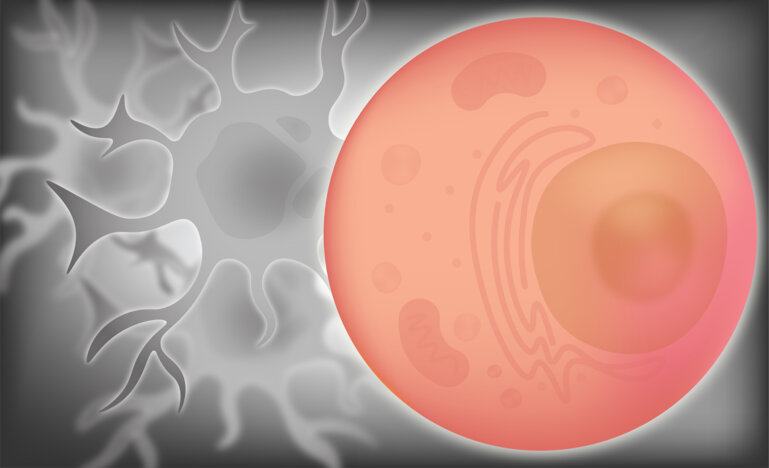Research is ongoing to investigate influencing factors of immune checkpoint inhibition, encouraging a more holistic understanding of individual characteristics to improve clinical outcomes
At their best, immune checkpoint inhibitors (ICIs) produce such durable responses in cancer patients that certain types of advanced disease, such as metastatic melanoma, could in the future be considered curable. A recent meta-analysis presented at the ESMO Congress 2021 additionally reported that immunotherapy provided individuals with substantially better quality of life than chemotherapy — something which is increasingly recognised as a key therapeutic goal in every disease setting (Eur J Cancer 2021 December 1;159:154-166).
Mitigating this positive finding, however, immunotherapy is effective in less than one third of patients (N Engl J Med. 2012;366:2443-2454). Understanding why some individuals do so well with the treatment while the majority fail to see any benefit at all is therefore an active field of research which is seeing a variety of patient characteristics emerge as potential levers to predict and improve its efficacy, from well-recognised factors like age and ethnicity to more recent discoveries such as the impact of the gut microbiome and sex. This leads some to argue that clinical oncology should focus not only on the molecular features of the tumour, but also on the unique person in which it arises to make personalised medicine a reality for more patients in the future.
Sex can influence the risk-benefit ratio of immunotherapy
Despite extensive documentation of women’s higher susceptibility to toxicity from a variety of medicines including chemotherapy (J Natl Cancer Inst. 2021 April;113(4):400-407), which is also related to differences in body composition between men and women (Clin Cancer Res. 2007 June 1;13(11):3264-3268), it is only in the last few years that the implications of this for patient care have begun to attract interest in oncology. “Clinical trials are currently not powered to detect gender differences in toxicity and efficacy of medicines or test different doses for men and women, leading to new agents being approved for both sexes when we know they may not have the same risk-benefit ratio in each population,” explains Dr. Berna Özdemir, Bern University Hospital, Switzerland. A member of the ESMO Gender Medicine Task Force, Özdemir advocates for the revision of trial design to collect and analyse data disaggregated by sex, as well as for the use of cells and animals of both sexes in preclinical studies.
She believes such a change is all the more important because the mechanisms underlying these sex differences could have implications for better managing adverse events of cancer treatments and boosting their efficacy in both sexes.
For instance, women may be significantly more prone than men to immune-related adverse events of moderate and severe intensity as reported by interim results for the first 106 patients in an ongoing prospective study investigating gender differences in susceptibility to immunotherapy side-effects (Ann Oncol. 2021 September 1;32(S5):S1223-S1224). The study confirmed previous findings (J Thorac Oncol. 2018 October 1;13(S10):S466) and suggested that women receiving immunotherapy could benefit from closer monitoring to detect and treat side-effects early. “However, we should additionally consider whether the flat dosing of immune checkpoint inhibitors currently in use actually needs to be adapted to each sex,” Özdemir suggests.
Recent evidence also shows females’ propensity to mount stronger immune responses than males, which likely contributes to women’s lower cancer risk thanks to better immune surveillance of malignant cells (Nat Rev Immunol. 2016;16:626-638). “It is thought to be driven simultaneously by the implication in immune function of genes located on the X chromosome, and by the different effects that sex hormones like androgen and oestrogen have on the body’s immune cells (Clin Cancer Res. 2019 August;25(15):4603-4610),” says Özdemir. This, she highlights, means that contrary to previous assumptions sex can also play a role in cancers arising in non-reproductive organs. One example comes from research in melanoma, a disease significantly more prevalent in men, which has recently shown cancer cells in mice to be dependent on androgen-receptor signalling to stabilise their DNA, and suggested that inhibition of this signalling could trigger tumour infiltration by immune cells thus opening a path to improving the efficacy of immunotherapy in this cancer type (J Exp Med. 2021;218(2):e20201137).
While the question of whether the efficacy of ICIs equally varies between men and women remains controversial (Molecules 2019;24(18):3214), Özdemir is convinced that better understanding the complex interactions between patient sex and cancer development and treatment could lead to differentiated therapeutic approaches for men and women in the future.
The way to a patient’s tumour may be through their digestive system
Sex is also known to be a differentiating factor in the composition of the gut microbiome, which is attracting intense research interest as a potential confounder of immune checkpoint blockade. Dr. Lisa Derosa, Gustave Roussy Cancer Campus, France, works within the 18-centre international Oncobiome consortium dedicated to elucidating its role in modulating immune response and efficacy of immunotherapy: “Since we first identified abnormal microbiome composition, known as dysbiosis, as a mechanism of resistance to immune checkpoint inhibitors (Science 2018 January 5;359(6371):91-97), at least 35 retrospective and prospective datasets have been published around the world showing a negative impact of antibiotics, which can cause dysbiosis, on treatment with immunotherapy,” she reports. “In a meta-analysis we were then able to show a statistically significant reduction in overall survival among patients who had received antibiotics in the weeks before or after starting treatment with ICIs (Cancer Discov. 2021 October;11(10):2396-2412).”
Conversely, research into so-called gut onco-microbiome signatures (GOMS), has revealed that the abundance of certain bacteria such as Akkermansia muciniphila (Science 2018 January 5;359(6371):91-97; J Clin Oncol. 2021;39(15):S9019), and more generally a highly diverse composition of the gut microbiome is associated with improved efficacy of immune checkpoint inhibition (J Clin Oncol. 2020;38(15):S3095). This was confirmed at the recent ESMO Congress by an initial analysis of the Japanese MONSTAR-SCREEN project (Ann Oncol. 2021 September 1;32(S5):S382), which showed that the diversity of gut microbiota was significantly associated with higher overall response rates and longer progression-free survival in 167 patients with advanced solid tumours treated with ICIs. “The goal for the coming years will be to refine our knowledge of GOMS through the collection of geographically and demographically diverse faecal samples, from patients with and without cancer, to allow the development of reliable dysbiosis diagnostic tools capable of predicting response to immunotherapy,” Derosa explains.
Although the underpinnings of this causal link remain largely unknown, the practical successes recently achieved in circumventing melanoma patients’ initial resistance to ICIs by transplanting them with faecal microbiota from patients who did respond to the treatment (Sig Transduct Target Ther. 2021 May 8;6:178) make Derosa hopeful that microbiome-centred interventions could eventually increase the number of people who see long-term benefits from immunotherapy. “In future trials, we will aim to test different ways of acting on microbiome composition—not just with faecal matter transplants, but also through dietary changes, administration of pre- and probiotics or even certain antibiotics like vancomycin, which are able to increase the presence of bacteria associated with better response,” she says.
Parallel efforts are underway to understand the probable involvement of the gut microbiome in a person’s susceptibility to side-effects of anticancer therapies (Nat Med. 2021 July 8;27:1432-1441), including recently identified associations between certain types of bacteria and the onset of sarcopenia, or loss of skeletal muscle mass, in metastatic kidney and breast cancer patients (Ann Oncol. 2021 September 1;32(S5):S1211).
Looking ahead, however, Derosa emphasises that it will be important for research to learn to discriminate between effects related to the microbiome and the variety of other causes that may drive treatment toxicity or resistance in different individuals. “As we move forward with clinical trials of microbiome-centred interventions, we will collect samples not just of faecal microbiota, but also tumour tissue and other types of microbiome—for example vaginal samples from women with cervical cancer, and saliva from patients with head and neck cancers—to obtain a complete hologram of the patient that can guide us in further personalising immunotherapy to maximise its potential,” she concludes.







